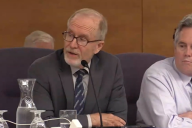You have /5 articles left.
Sign up for a free account or log in.
Strict limits on the number of times someone can use public space at a public university are unconstitutional, a federal appeals court ruled Friday. The ruling came in a suit brought by a controversial preacher against the University of Arkansas at Fayetteville over a series of policies, including one that limited him and others to five visits for public events a semester.
At the same time, a three-judge panel of the U.S. Court of Appeals for the Eighth Circuit upheld several other rules used by Arkansas for outside speakers seeking to use public space. Among those rules were a requirement that a permit be obtained, a requirement that the permit be registered at least three days in advance, and a ban on such activities during final exam periods.
The ruling may help clarify an area of the law that is at once straightforward and complicated. Courts have consistently ruled that public colleges and universities, under the First Amendment, cannot bar free expression from their campuses, whether that expression is by students or faculty members or others.
The courts have also given colleges considerable leeway to regulate (or ban) the use of certain facilities (such as classrooms or a president's office) by outsiders, so that campuses can function smoothly. People seeking to engage in protests or public speaking have the greatest latitude if they want their activities to take place in public areas of a campus -- quads, walkways, open spaces, etc. The question in this case -- and for many public institutions -- is what sort of limits are appropriate in such spaces.
The plaintiff in the case, Gary Bowman, is an Oklahoma-based preacher who travels to many colleges, seeking to reach students. He is widely called "Moses" at the Arkansas campus. Bowman's campus visits frequently attract large crowds and anger as he condemns -- often with inflammatory language -- gay people, feminists and various other groups. A column in The Arkansas Traveler after one of his campus appearances offered a list of types of people Bowman attacked, and press reports indicate that this list is similar to those he has derided at many other campuses:
"Drinker, smoker, glutton, breather, hippie, musician, fornicator, sorority member, fraternity member, gay, lesbian, Catholic, Episcopal, Jew, Buddhist, Taoist, Hindu, Muslim, Confucian, atheist, agnostic, pro-choice, anti-gay marriage amendment, Democratic, Republican, blond, brunette, redhead, hunter, fisher, Harry Potter fan, Lord of the Rings fan, Star Trek fan, Star Wars fan, Wizard of Oz fan, pop music fan, movie fan, Irish, sexually active, couch potato, casual dater, partier, speaker of any language other than English, newspaper or magazine subscriber, tax payer, potty mouth, day sleeper, postal carrier, truck driver, drive-thru window attendant, waitress, mall employee, zoo keeper, basket weaver, songwriter, liquor store clerk, student, unwed mother, single father, foreign car driver, consumer, soldier, judge, lawyer, doctor, professor, lover, hater, indifferent party, dissenter, or human being."
While Bowman's statements offend many, the appeals court found no evidence that the University of Arkansas regulated his appearances on the campus because of his views. Bowman made many appearances at the university, and was granted permits to do so. The litigation arose in 2001 when Bowman wanted to do a special series of appearances on the theme of the 10 Commandments -- with one appearance for each commandment. He then challenged the rule on five visits a semester, and several others.
The appeals court's ruling on the five visit rule noted that the university put forth a "significant" argument on behalf of its policy: that it "fosters a diversity of usage" and "prevents the monopolization of space." While those are valuable goals, the court found that the rule was not "sufficiently narrow," given the strong presumption in favor of free speech. The ruling noted that there are days for which there are no requests to use various campus spaces. As a result, the court found, the policy can have the impact of limiting Bowman's speech without advancing any worthy goal.
The university could, the court ruled, have a policy that starts off with a limit of five, and that would prevent any group from signing up for too many days, as long as there were also procedures to open up unused space later to interested parties. The university could even favor for such space groups that haven't previously signed up, the court said. The only ban was on an absolute limit, regardless of whether anyone else wanted the space.
The other rules challenged by Bowman were clearly constitutional, the court found. Requiring a permit, and requiring a permit three days in advance, the count found, were legitimate ways for the university to deal with its "significant public safety interest." (As it relates to Bowman, this need is not just theoretical: Security officers have had to set off barriers to deal with unruly, angry crowds during his visits.) As for the limits on appearances during "dead days" on which students prepare for and take final exams, the court found that this ban was reasonable and related to the university's "educational mission."
Bowman and university officials could not be reached for comment. William Kincaid, associate general counsel at Arkansas, told The Springdale Morning News that officials were studying the decision and couldn't say whether they would appeal the part that the institution lost.
"The big picture for us today is that Mr. Bowman challenged several aspects of the university's policy and the court upheld all but one aspect that was challenged," Kincaid said.








